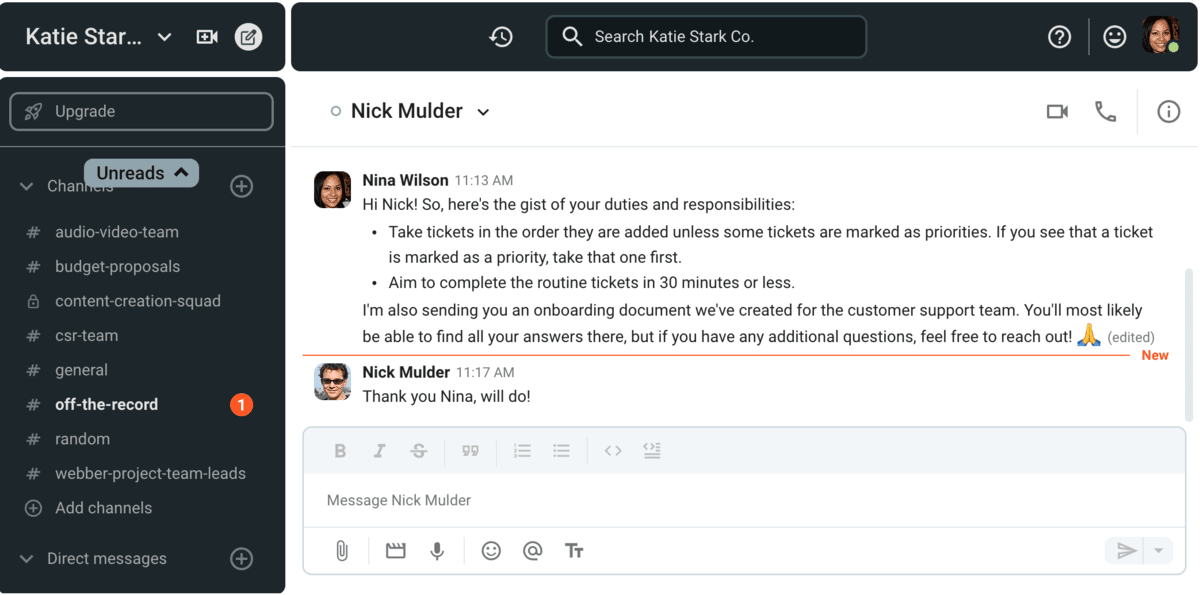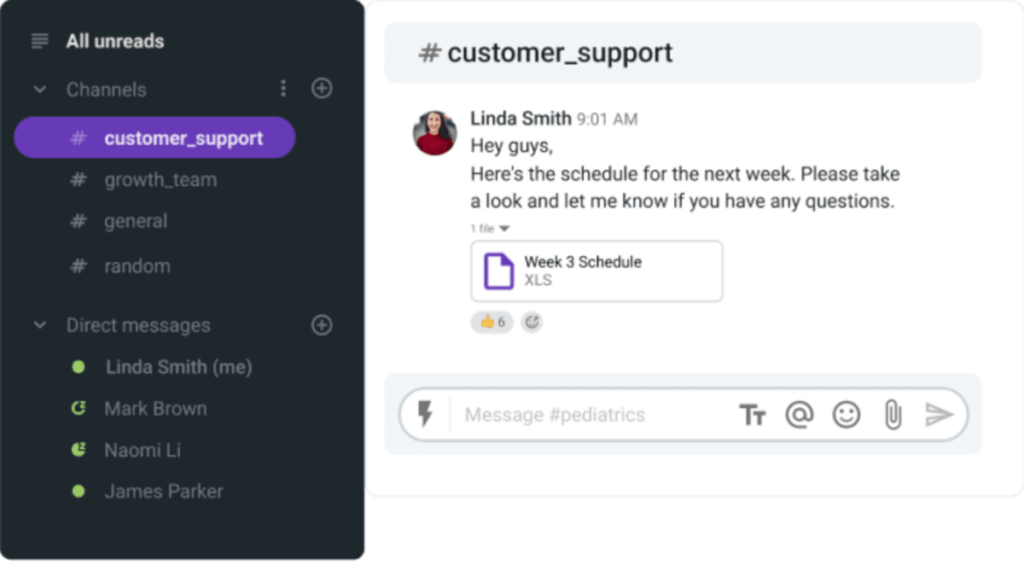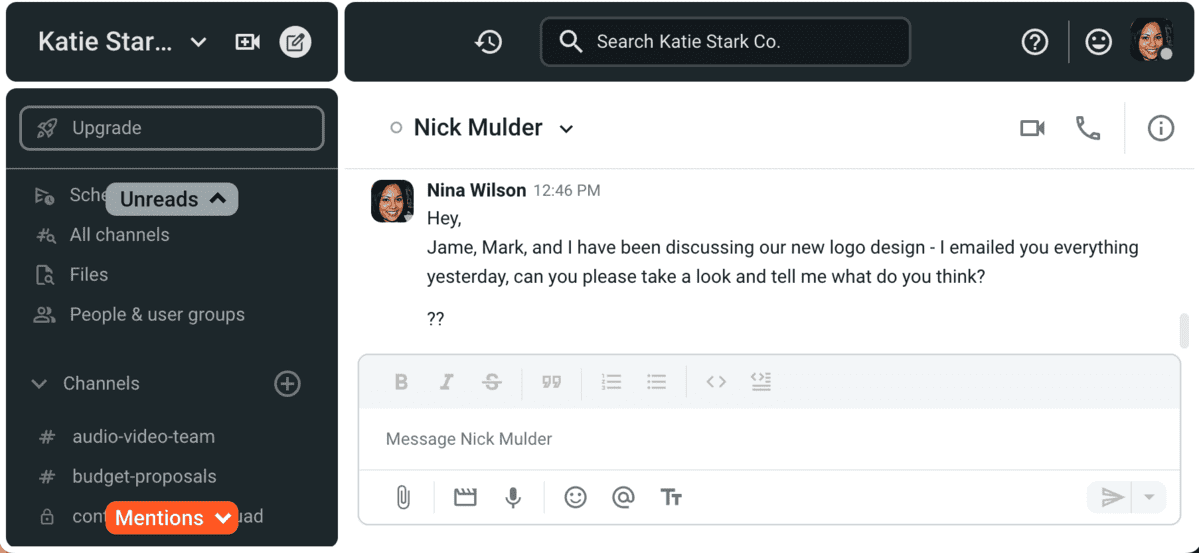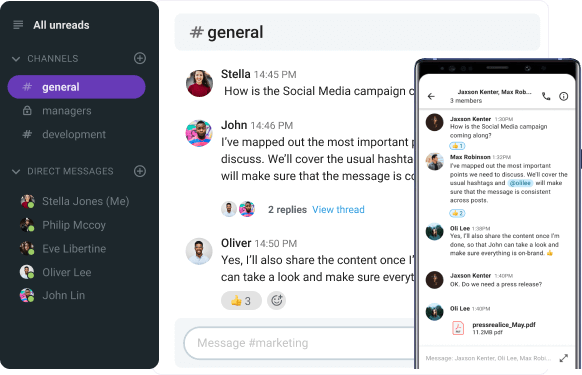Can you tell what these have in common?
- Waving to your coworker,
- Having a deep conversation with your best friend,
- Telling the waitress your order in a restaurant, and
- Sending a meme in the group chat.
If you haven’t guessed, here’s the answer — all of these are forms of interpersonal communication.
In this article, you’ll learn:
- What interpersonal communication is,
- What styles and types of interpersonal communication there are, and
- Why it’s important.
Plus, you’ll find out how to improve interpersonal communication in the workplace.
So, let’s start!
- Aside from verbal and nonverbal communication, interpersonal communication includes visual communication and active listening.
- Interpersonal communication enables effective information exchange and building relationships, and fosters collaboration and productivity.
- To improve interpersonal communication, you should start with self-analysis to figure out what you need to improve.
Table of Contents
What is interpersonal communication?
Interpersonal communication is the exchange of verbal and non-verbal information between two or more people.
Therefore, in this process people exchange:
- Thoughts,
- Opinions,
- Feelings,
- Ideas, and
- Information.
What are the types of interpersonal communication?
There are 4 main types of interpersonal communication:
- Verbal (includes oral and written communication),
- Nonverbal,
- Visual, and
- Active listening.
What does each one mean?
Type #1: Verbal communication
Verbal communication is the interpersonal communication type that transmits information using words, and it involves oral and written exchange of information.
Oral communication uses spoken language to share a message.
Written communication is a type of verbal communication in which you transmit information, opinions, and thoughts through symbols — in most cases, letters.
Type #2: Nonverbal communication
The type of interpersonal communication that conveys information without using words is nonverbal communication. It can accompany verbal communication or take place by itself.
Nonverbal cues can be:
- Facial expressions,
- Body language,
- Tone of voice,
- Gestures,
- Eye contact,
- Touch, and
- Interpersonal space.
Type #3: Visual communication
Visual communication is the interpersonal communication type that conveys information through visual elements, such as:
- Images,
- Videos,
- Presentation slides,
- Data charts,
- Roadmaps,
- Visual reports,
- Mind maps,
- Paper handouts, etc.
💡 PUMBLE PRO TIP
To learn more about the importance of verbal communication and different types of verbal communication, read our blog post:
Type #4: Active listening
Active listening is the type of interpersonal communication that doesn’t involve just listening to what someone is saying, but also:
- Being attentive and patient,
- Asking questions,
- Reflecting back on what is said,
- Asking for clarification if needed,
- Summarizing, and
- Making speakers feel valued and understood.
💡 PUMBLE PRO TIP
To learn more about the benefits of active listening and how to improve it, make sure to read our article:
Interpersonal vs intrapersonal communication
Interpersonal communication implies communication between two or more people. On the other hand, intrapersonal communication refers to communication with oneself.
As such, intrapersonal communication happens in our head and includes:
- Self-talk,
- Visualization,
- Imagination, and
- Recall and memory.
With that in mind, intrapersonal communication is concerned with thoughts and analysis, while interpersonal communication is based on exchanging ideas, thoughts, or feelings.
Hence, interpersonal communication focuses on the interaction between people, building relationships, and enabling collaboration ― while intrapersonal communication refers to self-analysis, enabling self-awareness and personal development.
5 Tips on how to improve interpersonal communication in the workplace
There is no doubt that interpersonal communication is an important factor in achieving success, both on an individual level and organization-wide.
If that’s not your biggest strength, here are 5 tips to improve interpersonal communication in the workplace:
- Figure out what you need to improve,
- Work on your communication skills by observing others,
- Understand (and be aware of) different communication styles,
- Schedule regular team meetings and team-building activities, and
- Learn to control your emotions.
So, let’s dig deeper into each of these tips.
Tip #1: Figure out what you need to improve
This is where intrapersonal communication comes into play. Before you do anything else, you need to — as objectively as you can — figure out what you need to work on.
Do you have trouble initiating a conversation? Are you too hot-headed and tend to say something you don’t actually mean? Do you struggle with listening attentively? Are you passive-aggressive? How often do you interrupt others?
Pay attention to the way you interact with others and see what you can change. You can also openly ask someone you trust what they think you should work on.
Tip #2: Work on your communication skills by observing others
As an introvert who worked hard to develop my communication skills, I can say that these two things are game-changers:
- Observing what effective communicators do and how they interact, and
- Practicing.
Think about people in your surroundings who have great communication skills. What do they do? How do they interact with others? How do they behave in certain social situations? What does their body language look like?
When you get the chance, try to apply some of the things they do. Be patient — it takes a lot of practice.
Also, don’t try to do 10 things at once. Begin with only one, for example, making an effort to open up your body language. When you get comfortable with that, move on to the next one.
Tip #3: Understand (and be aware of) different communication styles
Just like people have different personalities, they also have different ways of communicating.
Your extroverted coworkers might prefer talking face-to-face or via video calls, while emails and team messaging software might work better for the introverted part of the team.
Some people you come across are assertive, while others can be passive-aggressive. Some are talkative, some are quiet.
If you want to take your communication skills to the next level, you have to make an effort to understand the way people around you communicate. (Maybe you’ll find out that that one coworker doesn’t dislike you, they just dislike talking.)
Get to know your team and their communication styles — it will help you to interact and collaborate better.
💡 PUMBLE PRO TIP
If you are curious to learn more about different communication styles, our guide might help:
Tip #4: Schedule regular team meetings and team-building activities
Speaking of getting to know your team — to be able to do so, schedule regular team meetings and team-building activities.
This is especially important if you’re working remotely. It’s hard to talk to someone you see once every two months (and even then, only from the shoulders up).
The more you see each other, the more comfortable you get around each other, which results in better and more open communication.
💡 PUMBLE PRO TIP
If you’re looking for ideas for team-building activities and games, check out:
Tip #5: Learn to control your emotions
If you are emotional, stressed out, or upset, it’s not very likely that you’ll be able to hold a productive and efficient conversation. And communication in the workplace should be just that — constructive and professional. Emotional outbursts are a no-go.
Learning to regulate your emotions is a long and hard process, but for a quick fix, here’s what you can do:
- Identify your emotions: What are you feeling right now?
What made you feel that way?
What do you want to do about these feelings? (e.g. scream, cry, vent to someone, etc.)
Is there a better way to deal with these emotions? - Accept your emotions. Repressing them is not only unhealthy but also not productive at all.
- Give yourself some space to process what you’re feeling.
- Learn a deep breathing technique that will help you calm down.
Why is interpersonal communication important in the workplace?
Imagine a workplace where interpersonal communication doesn’t exist. Team members don’t talk to each other and have no idea what each of them is doing, managers aren’t bothering to communicate expectations and responsibilities, suppliers don’t answer their phones…
Everything would turn into a mess very fast, right?
Let’s look into everything that would be missing in that scenario and learn why interpersonal communication is so important in a business setting.
Reason #1: Interpersonal communication helps you to exchange information effectively and boost productivity
Since the definition of communication is to exchange information, it comes as no surprise that good communication results in better information flow.
Interpersonal communication, when done right, has a big role in sharing data and knowledge quickly and efficiently.
And when you have all the information you need easily available, you can focus on doing your job — thus being more productive.
💡 PUMBLE PRO TIP
Learn more facts about workplace communication:
Reason #2: Interpersonal communication facilitates solving problems and making decisions
When it comes to problem solving and decision making, good interpersonal skills are an invaluable asset.
Possessing such skills allows people to:
- Adequately express themselves,
- Precisely describe the problem,
- Discuss, and
- Build on each other’s ideas.
Also, open communication ensures that the solution will benefit everyone involved (or at least try to).
Everyone should feel valued and comfortable sharing their input — if they aren’t, brainstorming sessions won’t be a big success.
Arguably, the best problem-solving technique is preventing problems — and good communication prevents potential miscommunication, misunderstandings, and confusion down the road.
Reason #3: Interpersonal communication helps to build trust
Regular interpersonal communication builds trust among coworkers. As stated in an article in the International Journal of Business and Management: “Trust and commitment do not just happen; they are forged and maintained through effective communication.”
Trusting people you work with comes with many benefits, including:
- Decreased stress levels and hostility,
- Increased productivity and efficiency,
- Giving and receiving support,
- Increased morale and motivation,
- Decreased micromanagement, and
- Higher employee retention.
💡 PUMBLE PRO TIP
To learn more about how to build trust in virtual teams, make sure to check our blog post:
Reason #4: Interpersonal communication forms contacts and maintains relationships
No man is an island — especially in business. Networking can open doors you didn’t even know existed, boosting your career better than any resume can.
Making (and maintaining) new contacts opens you up to new resources and fresh ideas — you may even be offered a great business opportunity before others. Your connections can also provide you with referrals, mentoring, training, and other opportunities for professional growth.
Moreover, you may develop some new, interesting friendships.
💡 PUMBLE PRO TIP
To learn more about how to network effectively and how to network if you’re shy, check our blog post:
___
All things considered, interpersonal communication in the workplace is essential for effective exchange of information, which consequently boost our productivity and help us solve problems. As a result, it helps us build trust and maintain healthy relationships.
What interpersonal communication skills are important in the workplace?
Whether you’re just entering the workforce or you’ve been working for decades, good interpersonal communication skills will always put you at an advantage. Interpersonal skills are tactics and strategies that people use to effectively interact with others.
Do you feel like interpersonal communication is not really your strength?
Don’t worry — good communicators are made, not born. Workplace communication is not one skill, but a couple of skills stacked on top of each other with a trench coat on.
We listed the most important ones, so you can see which ones you need to work on:
- Active listening,
- Being receptive to feedback,
- Conflict management,
- Dependability,
- Empathy,
- Leadership,
- Negotiation, and
- Teamwork.
Interpersonal communication skill #1: Active listening
Active listening (which we already talked about) is the key to effective communication.
Fairly often, instead of listening carefully, we think about what we’re going to say next, where we should go for lunch, or if we remembered to turn off the stove this morning.
Active listening requires being fully immersed in the conversation and thinking about what the person is saying — not just waiting for your turn to talk.
If you want to be a better listener, pay attention to these things:
- Make eye contact — that shows you’re present and attentive. However, make sure to look away from time to time, as constant eye contact can be intimidating.
- Look at the other person’s body language — sometimes, nonverbal cues tell you more than words can.
- Don’t interrupt — maybe you remembered something very important or maybe you just tend to long jump to conclusions better than Olympic athletes. But, wait for the other person to finish. Interrupting is rude and can be frustrating for the speaker.
- Clarify what the other person is saying — you can ask questions, paraphrase, or summarize what has been said to make sure you’re on the same page.
- Stay focused — the simplest, yet the hardest thing to do.
Interpersonal communication skill #2: Giving and receiving feedback
If Michelangelo could say “I’m still learning” at the age of 87 — we can also do our best to never stop learning and improving.
Being criticized rarely feels good, but it’s important to learn to manage our emotions and take a look at our work as objectively as we can.
When you receive feedback, try to:
- Step back and process it — don’t act on impulse.
- Think about where it’s coming from — just as you shouldn’t automatically reject feedback, you shouldn’t automatically accept it either. Does that person have the credibility and knowledge to give valid criticism? Do other people think so too?
- Say “Thank you” professionally — also, you can explain your point of view, but don’t argue or get defensive.
With that in mind, if you’re in a position to give feedback, it’s important to be empathetic.
We talked to Jamie Levin, a communicator consultant with over 10 years of experience in corporate communication. She emphasized the importance of putting ourselves in the audience’s shoes while giving feedback.

“When giving feedback, it is extremely important to consider your audience and how they receive information. Are they easily offended? You might need to soften the blow. Do they prefer one-on-one communication? Avoid providing feedback in a group. So much of the acceptance of feedback is dependent upon our interpersonal communications skills.”
💡 PUMBLE PRO TIP
If you’re not sure when and how to ask your manager for feedback, read our blog post:
Interpersonal communication skill #3: Conflict management
Conflict management is the practice of resolving conflicts sensibly and efficiently. Conflicts are often unavoidable, so being able to manage and solve them is an incredibly valuable skill to have.
To start, here are a few steps you can follow:
- Understand what is the source of the conflict.
- Don’t add fuel to the fire — try to de-escalate the situation.
- Listen carefully and make sure everyone gets a word and an opportunity to share their side of the story.
- Analyze the conflict: What is the conflict really about? What could be the motivation for both parties to settle the conflict? What conflict management strategies have been tried in the past and how successful were they?
- Try to determine the solution that works for everyone involved.
💡 PUMBLE PRO TIP
If you want to get better at conflict resolution, check out:
Interpersonal communication skill #4: Dependability
Being dependable means you can be trusted to do something and people can count on you. Many employers consider it to be one of the best qualities for an employee to have, according to an Indeed article.
How to be considered a dependable person? Here are a few things you can do:
- Always show up on time.
- Never miss a deadline — and if something unexpected happens and you can’t make it, let your team know as soon as you can.
- Follow the company’s policies — they are there for a reason.
- Make sure your work is always high quality.
- Offer help to your teammates when they need it.
- Be consistent — what you say and what you do should always be in alignment.
Interpersonal communication skill #5: Empathy
Simply put, empathy is the ability to connect and understand others, as well as recognize what the other person is feeling or experiencing.
But, what is the connection between being able to put yourself in others’ shoes and being successful in business?
According to a Forbes article, empathy helps us better understand people, which also helps us communicate more effectively, as well as be innovative and competitive in business.
As the article states, “In a broad sense, developing an empathetic approach helps in connecting and establishing an environment of interest, allowing other people to feel heard and welcomed.”
💡 PUMBLE PRO TIP
To learn more about empathetic communication and how to develop empathic communication skills at work, read our blog post:
Interpersonal communication skill #6: Leadership
Effective leaders are a crucial part of any successful organization — they create a productive work environment, increase employee engagement, and motivate everyone to do their best.
If you aim to be a great leader, here are some of the qualities you have to possess:
- Efficient problem-solving,
- Excellent communication skills,
- Ability to motivate others,
- Integrity,
- Reliability,
- Resilience,
- Good decision-making skills,
- Ability to teach and mentor, and
- Emotional intelligence.
Not an easy job — but that’s why good leaders are so valuable.
Interpersonal communication skill #7: Negotiation
You don’t have to work in the FBI to be in a position to negotiate something. Whether you want a raise or to buy something for a better price, negotiation skills are something all of us can benefit from.
According to Harvard Business School Online, here are the key principles to successful negotiation:
- Effective communication,
- Emotional intelligence and the ability to control your emotions,
- Planning ahead and having a clear idea of what you want to achieve,
- Creating value — ideally, coming up with the solution that benefits both parties,
- Strong strategy — defining your role, understanding your value, and understanding the other person’s vantage point,
- Reflection — thinking about your past negotiation and identifying areas that need improvement.
Interpersonal communication skill #8: Teamwork
For a lot of jobs, one of the most crucial interpersonal skills is being able to function within a team.
Being good at teamwork requires:
- Showing empathy,
- Communicating clearly and transparently,
- Being accountable and responsible,
- Encouraging others to share their input and listening well,
- Being honest, but respectful,
- Wanting to help others,
- Having a collaborative instead of a “me, me, me” attitude.
💡 PUMBLE PRO TIP
To find out what the important skills teamwork and collaboration are, and how to foster teamwork, read our article:
What are the elements of interpersonal communication?
Every communication situation between two or more people consists of the following elements:
- Communicators,
- Message,
- Noise,
- A channel of communication,
- Context, and
- Feedback.
Let’s find out what each one entails.
Element #1: Communicators
For communication to occur, there must be at least two people who are aware of each other’s presence. They are called communicators.
Sometimes, they are referred to as a sender and receiver (of the message), but those terms overlook the reciprocal nature of communication. Interpersonal communication is interactive. Both communicators are simultaneously involved in the interaction, either by speaking or by sending nonverbal cues — smiling, nodding, adjusting their body language, etc.
Element #2: Message
The message is information, ideas, or instructions passed by one person to another. It doesn’t only include words, but also tone of voice, body language, gestures, and facial expressions.
One sentence can have completely different meanings depending on the nonverbal part of the communication. Imagine these two scenarios:
- Your boss telling you “Good job!” excitedly while smiling and patting you on the back.
- Your boss telling you “Good job.” sarcastically, while rolling their eyes.
The words that came out of their mouth are completely the same — yet, in one situation you would feel happy and proud, while in the other you would know you messed up.
Element #3: Noise
The noise refers to anything that obstructs the meaning of a message, so what is received is different than what is intended by a sender.
The noise can be:
- Lesser known jargon,
- Cultural and language barriers,
- Inappropriate body language,
- Complicated or ambiguous words,
- Environmental noise,
- Inattention,
- Disinterest, etc.
All of those things can create a gap between what’s said and what’s understood.
💡 PUMBLE PRO TIP
Learn more about communication barriers and how to overcome them:
Element #4: Feedback
Feedback serves as a confirmation of whether the message has been interpreted correctly or not.
It can be as subtle as a slight difference in facial expression or as direct as “Sorry, I’m not quite sure what you meant by that.” Just like the message, the feedback can be both verbal and nonverbal.
💡 PUMBLE PRO TIP
If you’re working remotely, and you’re not sure how to give feedback effectively, make sure to check out our blog post:
Element #5: Context
No communication exists in a vacuum — it’s influenced by a variety of factors, such as:
- The situation in which communication takes place,
- Environment,
- Culture,
- Roles and relative status of the communicators,
- Time,
- Place, and so on.
The way a recipient interprets the message greatly depends on these factors.
Element #6: Channel
A channel of communication is the medium by which the message is transferred. In business communication, the most used channels are email, audio and video calls, and team messaging apps, in addition to face-to-face meetings.
Interpersonal communication styles
In their book Management: Function and Strategy, Bateman and Zeithaml identified 6 styles of interpersonal communication that are used in business settings:
- Controlling,
- Egalitarian,
- Structuring,
- Dynamic,
- Relinquishing, and
- Withdrawal.
Each one of these has its place in certain circumstances.
Style #1: Controlling
Controlling communication style involves one-way communication and is typically used by those in power. The purpose is to direct others and/or give orders. This style of communication is the most useful during times of crisis.
For example, managers use a controlling communication style while giving instructions on how to complete tasks.

💡 Pumble Pro Tip
To find out more how you should communicate with your employees during a time of crisis, read our full guide:
Style #2: Egalitarian
Egalitarian communication style is two-way, interactive, and cooperative. It encourages feedback and sharing thoughts and opinions. Due to its collaborative nature, this style is often more effective than the controlling one, especially in environments that require teamwork.
For instance, you can use the egalitarian communication style to discuss the status of the current project with your teammate.

Style #3: Structuring
Structuring communication style’s purpose is to:
- Establish schedules,
- Impose organization, and
- Inform everyone of goals and procedures in the company.
It works best when it’s combined with the egalitarian style — those two together create a balanced and productive company culture.
For example, managers use the structuring communication style when sharing company policies and schedules.

Style #4: Dynamic
Dynamic communication style is high-energy, with a goal to motivate and inspire others to do something.
Use it wisely — it can be ineffective if your audience doesn’t have enough knowledge or experience to successfully take action.
Typically, managers who want to energize and boost their team members’ motivation use the dynamic communication style.

Style #5: Relinquishing
Relinquishing communication style implies being highly receptive to the ideas of others. Sometimes, to the point where others take the initiative, while the manager listens and makes comments here and there.
This style is effective when team members are dependable, responsible, and knowledgeable.
For example, you can use the relinquishing interpersonal communication style to ask your teammates to share impressions about the first draft of a new website design you created.

Style #6: Withdrawal
Withdrawal communication style is best described as — lack of communication. It can be a result of:
- Disinterest,
- Passiveness, or
- Unwillingness to participate in discussions.
For example, if you are about to share your ideas on a new website design, and your manager is unwilling to listen to what you have in mind, they use a withdrawal communication style.

Conclusion: Interpersonal communication skills will always put you at an advantage
Every job includes communicating with people to a certain degree, which is why everyone should aim to work on their communication skills.
Interpersonal skills that are the most in demand right now are:
- Active listening,
- Being receptive to feedback,
- Conflict management,
- Dependability,
- Empathy,
- Leadership,
- Negotiation, and
- Teamwork.
Improving these skills by following the tips outlined in this blog post will help you boost your career in many different ways — from improving your productivity to building a professional network.
✉️ What about you? In your opinion, what is the most important interpersonal communication skill in the workplace? Do you have any tips on how to improve interpersonal communication?
Share your experience and tips at blogfeedback@pumble.com and we may include your answers in this or future posts. And, if you liked this blog post and found it useful, share it with someone you think would also benefit from it.




